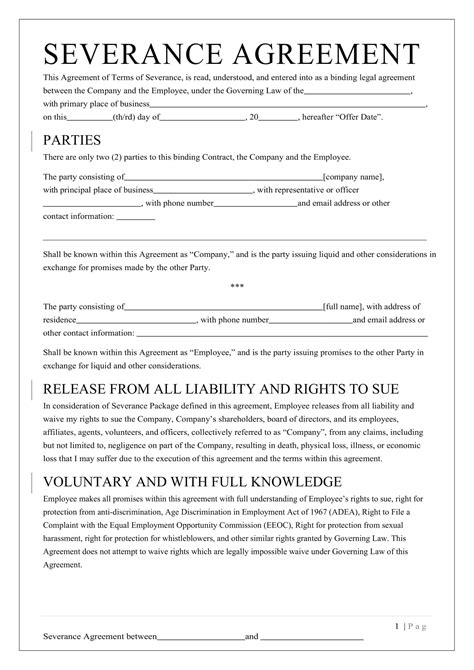Severance Agreement: What You Should Know About Time
A severance agreement is a legally binding contract between an employer and an employee, outlining the terms of their separation. While the financial aspects often take center stage – the severance pay itself – understanding the timelines involved is crucial. Failing to grasp these deadlines can significantly impact your rights and future opportunities. This article delves into the critical time-sensitive elements of severance agreements, helping you navigate this often complex process.
What is the typical timeframe for negotiating a severance agreement?
The timeframe for negotiating a severance agreement varies widely depending on several factors, including the size of the company, the employee's position, and the circumstances of the termination. In some cases, an agreement can be reached quickly, within a few days or weeks. However, more complex situations, particularly those involving senior executives or disputes over the terms, can extend negotiations for several weeks or even months. Employers often present a first offer relatively quickly, but counter-offers and revisions can take time. Be prepared for a negotiation process, not a simple acceptance.
How long do I have to sign a severance agreement?
There's no single answer to how much time you have to sign a severance agreement. The agreement itself may include a deadline, often ranging from a few days to several weeks. Ignoring this deadline could jeopardize your entitlement to the offered severance. However, exceeding the deadline doesn't automatically invalidate the agreement. It's important to understand that negotiations can often extend beyond the initial deadline, and many agreements include clauses allowing for extensions. Always consult with an attorney before signing anything. They can advise you on the implications of meeting or missing the stated deadline.
What happens if I don't sign the severance agreement by the deadline?
Failing to sign a severance agreement by the stipulated deadline can have several consequences. The most significant is likely forfeiting the severance package entirely. The employer may withdraw the offer, leaving you without any compensation beyond your final paycheck. Furthermore, the employer is then free to proceed without the constraints of a negotiated agreement, meaning potential legal challenges regarding the termination itself might become more difficult. In short, missing the deadline often severely weakens your bargaining position.
What are the deadlines related to filing for unemployment?
The deadlines for filing for unemployment benefits vary significantly by state. These are separate from the severance agreement and are crucial to understand. Generally, you need to file your claim within a specific timeframe after your last day of employment. Missing this deadline can mean losing potential unemployment benefits altogether. Check your state's unemployment agency website for the exact deadlines and requirements. Your severance agreement shouldn't affect your eligibility for unemployment unless it explicitly states otherwise (though it will generally affect the amount you receive).
How long does it take to receive severance pay after signing the agreement?
The time it takes to receive your severance pay after signing the agreement also varies. Some companies may process payments quickly, within a few weeks. Others might take longer, potentially several months. The severance agreement itself will often outline the payment schedule. If the agreement is silent on this, it's worth inquiring with the employer about the expected timeframe.
Can I negotiate an extension on the deadline to sign the severance agreement?
Yes, you can usually negotiate an extension on the deadline to sign a severance agreement. However, this requires proactive communication with the employer. Be polite but firm in your request, clearly stating your reasons for needing additional time (for example, to consult with an attorney). The employer is under no obligation to grant an extension, but it's worth trying. Remember, time is of the essence; initiate this communication well before the deadline approaches.
Disclaimer: This information is for general guidance only and does not constitute legal advice. It is crucial to consult with an attorney before signing any severance agreement to fully understand your rights and obligations. The specific timelines and requirements will vary depending on your location, employment contract, and the specifics of your termination.

